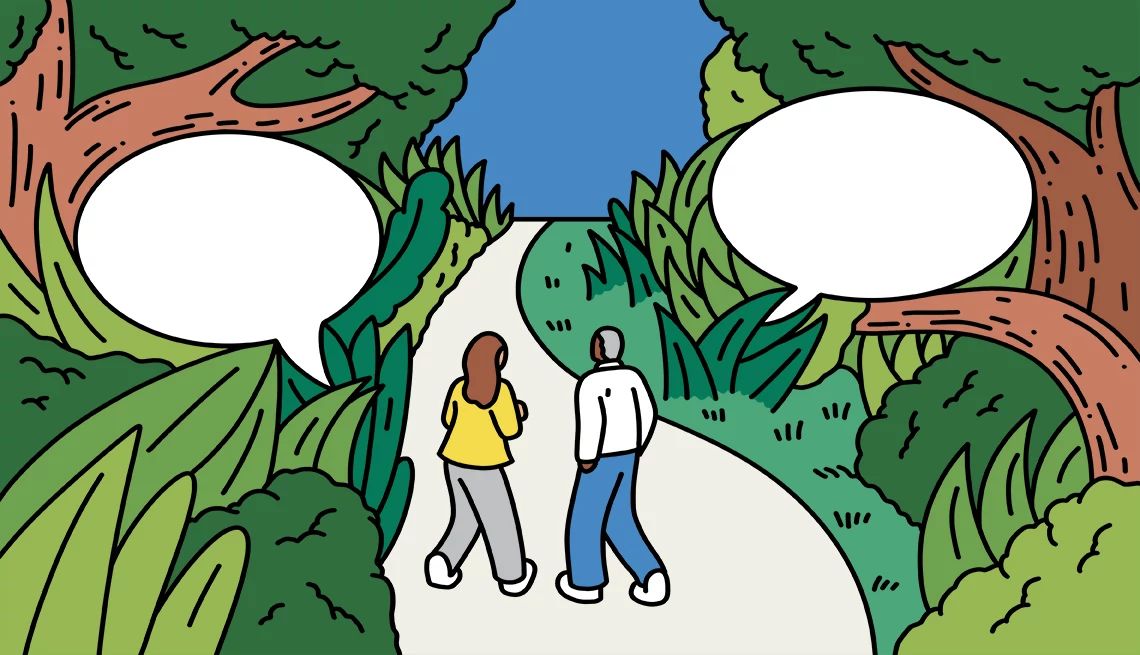AARP Hearing Center


With the loneliness epidemic unfortunately going strong in the U.S., maintaining good relationships is absolutely key to the health of older adults. According to the AARP-sponsored National Poll on Healthy Aging, one third of older adults report feeling lonely. But part of any relationship, especially one that you’ve had for years, usually means having to say you’re sorry at one point or another for something you said, did or didn’t consider.
This is when your apology can make or break your connection, so you want to make it a good one.
“If you fail to apologize, or you give a bad apology, it puts a crack in the very foundation of a relationship — and when you’re older, you may not have the same amount of time or opportunity to repair it,” says Harriet Lerner, a psychologist and relationship expert and author of Why Won’t You Apologize? Healing Big Betrayals and Everyday Hurts.
The dangers of being lonely
Lonely 50-plus adults suffer the same health risks as smoking 15 cigarettes a day, according to a report by the surgeon general.
Here are 25 ways to give the best apology you can to keep those important relationships strong.
1. Be specific
While “I’m sorry” is a necessary thing to say, it loses its meaning if not backed by precise language, says Jennifer Thomas, a clinical psychologist and coauthor with family counselor Gary Chapman of The 5 Apology Languages: The Secret to Healthy Relationships.
Lerner says that a good apology “always begins with naming specific words, actions or behaviors that you are sorry for, rather than implying that you’re sorry the other person reacted as they did.” If someone was offended by a joke you told at a party, a specific apology, says Lerner, would sound something like, “I want to apologize for the joke I told at the party. It was ageist and in poor taste. Your feelings make sense, and it won’t happen again."
2. Express your motivation
Thomas suggests that it may be helpful to explain your “why” to the person you are apologizing to.
“Why does it matter to you to repair the damage that you may have caused in your relationship?” she asks. Knowing the answer can help lead to change for the better. So try to meditate on why you may have snapped at a loved one (something that may become more common when experiencing pain or discomfort from changing bodies) or flirted with someone other than your significant other (which may happen when trying to feel sexy again in a changing body). Follow up any promise of self-reflective work with "‘Here’s what I’m going to do to make sure we don’t end up in this position again,’” Thomas says.
And remember, the apology is about the other person. “The purpose of an apology is to calm and soothe the hurt party, not to agitate or pursue them because you have the impulse to connect, explain yourself, lower your guilt quotient or foster your recovery,” says Lerner.
3. Be vulnerable and open
Shenandoah Chefalo, a consultant and coach trained in working with trauma survivors, has found that saying things such as “It's tough for me to admit that I was wrong,” “I regret my behavior” and “I’m not proud of what I said” are all ways to show the offended that you are being honest and open to hearing a different or difficult-to-hear point of view, which strengthens the apology.
Being vulnerable can be uncomfortable, but you should ask yourself what you have to lose, Thomas says. “We want to put this polished, perfect image out into the world, but what's attractive in other people is when they show their flaws and foibles, because it makes us feel safer.”
4. Be curious
Chefalo, who is based in Traverse City, Michigan, suggests showing interest in their feelings by asking questions such as:
- How can I support you as we move through this conflict?
- What do you need from me?
- What else are you upset about and want me to understand?
"Curiosity opens doors,” Chefalo says. “When we ask genuine questions instead of assuming we have all the answers, we ease tension and invite connection, making it possible to repair a relationship.”


5. Create a safe environment
When making an apology, it’s critical to feel like you and the person you want to make the apology to are in a neutral place, Chefalo says. To help ease fears and tension, find a coffee shop you both like, or meet up for lunch.
Don’t want to sit face-to-face? Chefalo suggests going on a walk or hike (what Chefalo and her spouse often do when it’s time to have a hard talk), taking a drive to a nice lookout point or engaging in some other activity the two of you enjoy. Do keep in mind how much privacy you might need, she adds. For example, maybe you want it to just be the two of you? Or maybe it would help to have a third party present? Just make sure you work out the details in advance so you’re all on the same page.
6. Go in knowing we’ve all got baggage
Chefalo says that there might be more to why they are upset than just what you said or did. The more you let them talk, the more that might become clear and help you avoid hurting them in the future.
“Oftentimes the thing that they’re complaining about you, to be quite honest, is something they’re working on themselves,” Chefalo says. While you may have said something that came across as offensive, she says that it may “remind them of the thing their mom said, or it reminds them of a relationship that went south.”
7. Repeat back what you hear
Even if you think you’re done with your apology, be open to listening to complaints that continue to exist so that you’ve done everything you can to address the other person’s pain.







































































You Might Also Like
AARP Smart Guide to Muscle Health
30 ways to maintain your strength as you age
More From Drew Barrymore’s AARP Cover Story Interview
The outtakes from the actress’s chat with writer Natasha Stoynoff will surprise and delight
How I Relearned the Art of Doing Nothing
After a stressful career, a move to Italy motivated me to change my pace